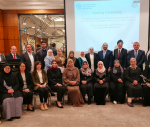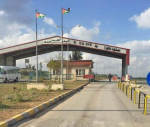You are here
Central Asia's bidding war for Russian emigrants
Oct 22,2022 - Last updated at Oct 22,2022
BISHKEK — Bishkek’s residents have been confronted with an unusual sight these past few weeks: the streets of Kyrgyzstan’s capital teeming with tens of thousands of educated men with European features: Russian citizens fleeing President Vladimir Putin’s “partial mobilisation” of 300,000 reservists to fight his war against Ukraine. The Kyrgyz people and government have welcomed them with open arms.
Many other Eurasian cities such as Tbilisi (Georgia), Baku (Azerbaijan), Yerevan (Armenia), and Almaty (Kazakhstan) have also seen an influx of Russian draft dodgers. While Russians have been relocating to Eastern Europe and Western Asia since Russia invaded Ukraine in February, the Kremlin’s first large-scale mobilisation effort since World War II has turned what had been a steady trickle into a flood. The reason is simple: None of these former Soviet republics, in Russia, they are often referred to as the “near abroad,” require entry visas for Russian citizens. Long dismissed by Russians as mere reservoirs of cheap labour, these countries now see Russia’s brain drain as an opportunity to acquire the skilled knowledge workers they badly need.
Immediately after Putin announced the mobilisation, queues began forming at checkpoints along all of Russia’s borders with former Soviet republics. At the Upper Lars checkpoint on the Russian-Georgian border, so many cars lined that people had to wait up to four days to cross.
In the three weeks since Putin launched his draft, 700,000 people have reportedly left Russia. Earlier this month, Kazakhstan reported that 200,000 Russian citizens had entered the country since September 21. Meanwhile, Georgia reported that the number of Russians who arrived in the country increased by 40-45 per cent, to 53,000, during the same period. And the European Union’s Border and Coast Guard Agency, Frontex, reported that 66,000 Russians entered the EU in the last week of September, a 30 per cent increase from the previous week.
So far, Russia’s ministry of defence has not demanded that the governments of Georgia, Kazakhstan, and other countries extradite the Russian deserters and draft dodgers who have crossed their borders. But it is doubtful that this permissive policy will last if the Russian military continues to suffer severe manpower shortages.
Meanwhile, Russian emigrants in Central Asia and those planning to emigrate have been using Telegram channels as their primary source of information. The most popular channels include “Relocation to Kazakhstan” (34,000 subscribers), “Relocation to Uzbekistan” (26,000 subscribers), and “Welcome to Kyrgyzstan” (22,000 subscribers). Russian journalist Maria Maksimycheva, who moved from St. Petersburg to Tashkent this spring and operates a Telegram channel about life in Uzbekistan, described the benefits of moving to Central Asia: “Great support communities for relocators, a rapidly developing economy, warm climate, comfortable life.”
It should come as no surprise that the Russian expats are already transforming their host countries. With hotels and hostels crammed to capacity, rents are skyrocketing. Some tenants have been evicted from their apartments in favor of higher-paying Russians.
Nonetheless, sympathetic locals across the ex-Soviet countries have welcomed the new arrivals. Central Asian governments, for their part, have quickly realised that taking in highly-skilled Russian professionals, especially Russia’s much-vaunted tech elite, could boost their economies and improve their education systems.
Kazakhstan, for example, is enthusiastically attempting to attract Russian emigrants. The country provides foreigners who work in the Astana Hub industrial park with five-year visas and exempts them from almost all taxes. It also gives startups business-development grants of up to $50,000 and 12 months of free office rent. Likewise, Uzbekistan is now issuing three-year visas that provide tech workers with access to all social services and the right to apply for permanent residency.
Kyrgyzstan has also entered the competition, granting Russian exiles “digital nomad” status, which allows Russians to work without a permit, receive a personal-identification number immediately, and obtain simplified services from the ministry of justice and the tax authorities. According to Economy and Commerce Minister Daniyar Amangeldiev, the goal is “creating favorable conditions for the relocation of such people to the Kyrgyz Republic”.
Admittedly, the migration wave is probably temporary. Many Russian emigrants, especially those who left their jobs and did not find new sources of income abroad, will most likely return to Russia when they feel it is safe. But those who can work, earn money, and feel comfortable in exile will not rush back. And, of course, there will be those who would not want to live in an isolated country like Russia today. Some have already bought houses in Bishkek, while others have applied for Kyrgyz citizenship.
Many of those fleeing Russia these days belong to the country’s intellectual elite. If the Ukraine war leads to a permanent brain drain, the Russian economy will suffer even more than it already has. The country’s best minds will continue to seek new homes abroad, and their former Soviet compatriots will be only too happy to oblige.
Djoomart Otorbaev, a former prime minister of Kyrgyzstan, is the author of the forthcoming “Central Asia’s Economic Rebirth in the Shadow of the New Great Game” (Routledge, 2023). Copyright: Project Syndicate, 2022.












